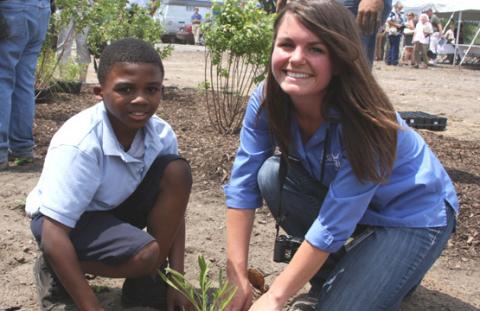
Illinois-Indiana Sea Grant
If you want to help conserve our natural resources, you have to understand people.
Education
- B.S., Natural Resources and Environmental Sciences, University of Illinois at Urbana-Champaign
- M.S., Human Dimensions of Natural Resources, Colorado State University at Fort Collins
Salary
$60,000 - $80,000
Contact
What is your current job and what does it entail?
I perform outreach, education and social science research to help Great Lakes communities understand and become involved in multi-million dollar environmental cleanups in their hometowns. These cleanups are led by the U.S. EPA under the Great Lakes Legacy Act. They revive lakes and rivers that have been plagued by a century of pollution and habitat degradation. It's important for local stakeholders to have a voice in the planning and design of such projects because they are the ones who will remain after the project is over. They are the long-term stewards.
What was the key factor in your career decision?
I originally pursued environmental science because I love science and the outdoors. I had the naïve idea that scientists don't deal with people -- they sit isolated in a lab or forest and explore. In my undergraduate classes, I noticed a common theme: people. If you want to help conserve our natural resources, you have to understand people.
What do like most about your career?
That it's regional in nature. I love learning about and visiting so many different coastal communities around the Great Lakes. I like that my work helps to revitalize a region of communities environmentally, socially and economically. It's amazing to be a part of such a big effort.
What do you like least about your career?
Same thing, that it's regional in nature. I wish I could live in all of the communities that I serve. It would be much easier to understand the needs of my constituents if I shared aspects of their sense of place.
What do you do to relax?
I run Chicago's Lake Michigan path regularly. I sing along with my favorite artists, including Sara Bareilles and Florence and the Machine.
Who are your heroes/heroines?
Women in science. I recently read a National Geographic and was overwhelmed by an article about Sylvia Earle. She's a 77-year old oceanographer who takes regular diving expeditions to learn about and protect marine sanctuaries. Early in her career, she had to fight for her right as a woman to study the ocean, and now she runs the show. You go girl.
What advice would you give a student who expressed an interest in pursuing a career in your field?
Intern in science as much as you can in college. It might be easier to go back home for summer break and pick up your old after-school job, but it's worthless on a resume. More importantly, in an internship you get experience. Experience is the biggest deficit a young person has walking into a job interview, and being able to reference your work with practicing scientists will make you stand out.
Are career opportunities in your field increasing or decreasing and why?
Increasing! Universities, agencies, companies and non-profits are increasingly recognizing the value of social science. If you want to influence natural resource decision-making, you have to understand the people who make, and will be affected by, those decisions.
What will you be doing 10 years from today?
I love working for Sea Grant, and I hope to be doing so 10 years from now. My goal is to someday be the director of Illinois-Indiana Sea Grant, but that's a long way off.

